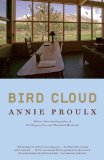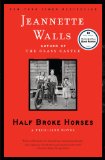Summary | Excerpt | Reviews | Beyond the book | Read-Alikes | Genres & Themes | Author Bio

Bell's memoir rides on the laurels of Annie Proulx's "Brokeback Mountain" and Judy Blunt's Breaking Clean. As a narrator, Bell is shy, even concealed, and trickier than Jeannette Walls (The Glass Castle, Half Broke Horses) or Mary Karr (The Liars' Club). Rather than looking for the nuances of an individual, readers will take pleasure in seeing how this narrator views the world around her and sets it to prose. Claiming Ground is not the portrait of a woman; it's the portrait of a place.
Claiming Ground starts at a barely audible murmur and resists the natural inclination to get louder as the narrative progresses. The book's opening line, "the sheepwagon door stands open to the early dawn," hints at a propensity for understatement and opacity, and throughout the memoir the reader is offered little more than the glimpses of a door left ajar and the "stiff sprigs of sage, their seedheads quivering against the wind." Bell shows readers a woman who claims space in a rancher's world; the vision of that space and those ranchers are crisp, even vivid, but the view of the woman is hazy.
The text fades in and out of scenes. Each chapter starts in the simplistic, meditative manner of the opening line, and then vacillates between moments of rowdy joy and tacit natural beauty. Readers follow Bell from her post-college youth to her cowboy future, first marriage, and career shifts without an inkling of Bell's motivation for these pursuits. Without the pull of empathy for the narrator, and without a clear idea of what she is seeking with her backcountry solitude and self-imposed exile, it is hard to complete one of the first steps of the intimate memoir genre: getting close to the narrator.
The text's natural resistance to weaving a reader-writer relationship, however, also functions metaphorically. The reader's inability to know and understand Bell as a dynamic character with her own implicit wishes, dreams, and fears is synchronous with Bell's struggle to find tenderness and intimacy in the isolated, withdrawn communities of Wyoming and the gloom of divorce and death.
Most literature that is set in the American west contends, in some way, with isolation and loneliness. Despite her desire to curb personal details, it is clear that Bell does not struggle with the loneliness that stifles many ranchers into (as Bell discovers) silence and alcohol. She embraces her laconic professions, and even seems to revel and find intimacy in them. Her embrace of shared, communal silence is clear when she writes of her relationship with her father:
"That we loved each other is clear. That we fumbled in that love is painful. What we had, in our shared blood, was the grace to lay ourselves out under a vast and forgiving sky and let its steady winds blow over us."
Claiming Ground is a richly visual piece of writing that is speckled with clips and images that stick, especially in the minds of readers who are familiar with (or fond of) Bell's alpine territory. Each slim, tidy chapter reads like a short story, which increases the text's pace and balances Bell's steady, detailed - almost myopic - writing style.
![]() This review was originally published in The BookBrowse Review in April 2010, and has been updated for the
April 2011 edition.
Click here to go to this issue.
This review was originally published in The BookBrowse Review in April 2010, and has been updated for the
April 2011 edition.
Click here to go to this issue.

If you liked Claiming Ground, try these:

by Annie Proulx
Published 2011
Proulx's first work of nonfiction in more than twenty years, Bird Cloud is the story of designing and constructing her dream house. It is also an enthralling natural history and archaeology of the region, and a family history, going back to nineteenth-century Mississippi riverboat captains and Canadian settlers.

by Jeannette Walls
Published 2010
Jeannette Walls's memoir The Glass Castle was "nothing short of spectacular" (Entertainment Weekly). Now, in Half Broke Horses, she brings us the story of her grandmother, told in a first-person voice that is authentic, irresistible, and triumphant.
I like a thin book because it will steady a table...
Click Here to find out who said this, as well as discovering other famous literary quotes!
Your guide toexceptional books
BookBrowse seeks out and recommends the best in contemporary fiction and nonfiction—books that not only engage and entertain but also deepen our understanding of ourselves and the world around us.